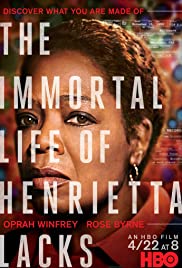
THE IMMORTAL LIFE OF HENRIETTA LACKS
US, 2017, 93 minutes, Colour.
Oprah Winfrey, Rose Byrne, Renée Elise Goldsberry, Ruben Santiago- Hudson.
Directed by George C.Wolfe.
This film is based on actual characters and events. It is based on a book by Rebecca Skloot who is played in the film by Rose Byrne.
The film takes audiences back into the 1950s, to an African- American community, to a woman called Henrietta Lacks, her illness, medical researchers using her cells. But it is also a story about the author and her researching Henrietta, interviewing family and friends, the flashbacks taking the audience into the past, the character of Henrietta, a genial woman, strong in the community, her relationship with her children, her illness and death.
What emerges is that the medical researchers at the time were so enthusiastic that they neglected to organise the permissions from the family. In later decades, members of the family, quite scattered in their characters and backgrounds, some being in prison, some with mental health problems, combined with Rebecca to interview people from the medical profession and to receive some compensation.
Because of her personality, the film does tend to focus very much on the character of the daughter, with mental problems, played by Oprah Winfrey. She gives a very impressive performance – but, in some ways, it does detract from the central focus on Henrietta Lacks herself, her life and death, and the contribution she made, after death, to medical progress.
1. True story? Of Henrietta Lacks, her surgery, the use of her cells, benefit because of the research and developments? The true story of the writing of the book?
2. The style of the film, produced by Oprah Winfrey and her presence in the film? The audience? The American audience? The wider audience?
3. The film for television, the television audience, the style of the narrative, straightforward flashbacks, enabling the audience to absorb the characters and issues?
4. The title, the book? Henrietta, her illness, surgery, her cells? The title of Hela? The development, Johns Hopkins and the research, the doctors? The using the cells, without reference to
the family? Making a profit? The family the discovery of the truth? The belief that Henrietta lived on in all those who benefit from her cells?
5. Oprah Winfrey as Deborah, her age, experience, mental and emotional life, the bond with her mother, and the early death, her place in the family, her brothers, the in-laws? Her not having knowledge of her mother, eager for the research, supporting Rebecca Skloot, the talk with her brothers, the growing reluctance, yet persuaded to continue? Rebecca Skloot and visits, the sharing of information? The homes, the town, the hospital, Deborah’s upsets?
6. Rebecca Skloot, in herself, the background information on reading, the connection with Johns Hopkins, her skill at writing? The plan, the support, research? The contact with Deborah? The talk, the excitement, the scenes of the typing, writing? Motivations and Deborah’s sometime wariness? Sharing with Deborah, suffering her attacks, the variety of visits, the old, the towns, the farms? Her brothers, the in-laws? The buildup of information about Henrietta?
7. The impact of the flashbacks, sympathy with Henrietta, life, marriage, family, the South and the times? Her loneliness, music and dancing? Illness?
8. The family, the memories, the flashbacks? The brothers, the man released from prison and his eccentricities? Rebecca Skloot and her cautions? The in-laws and the supplying of information and happy memories?
9. The visit to Johns Hopkins, Deborah, her brother, the sympathetic doctor, his explanations, looking at the cells, the microscopes? Learning what happened because of the use of the cells?
10. Deborah, satisfied, knowledge of her mother, within her family, the visit to Johns Hopkins and her being satisfied?
11. Rebecca Skloot, the achievement book’s popularity, years on the bestseller list?
12. Deborah, her dying, before the publication of the book – and the comment that she would have liked Oprah Winfrey to portray her?